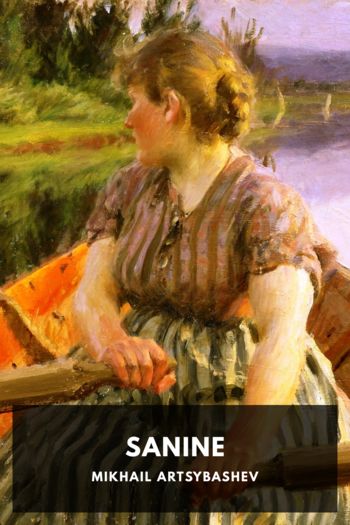Sanine by Mikhail Artsybashev (ebook pdf reader for pc .TXT) 📕

- Author: Mikhail Artsybashev
Book online «Sanine by Mikhail Artsybashev (ebook pdf reader for pc .TXT) 📕». Author Mikhail Artsybashev
By Mikhail Artsybashev.
Translated by Percy Pinkerton.
Table of Contents Titlepage Imprint Preface Sanine I II III IV V VI VII VIII IX X XI XII XIII XIV XV XVI XVII XVIII XIX XX XXI XXII XXIII XXIV XXV XXVI XXVII XXVIII XXIX XXX XXXI XXXII XXXIII XXXIV XXXV XXXVI XXXVII XXXVIII XXXIX XL XLI XLII XLIII XLIV Endnotes Colophon Uncopyright ImprintThis ebook is the product of many hours of hard work by volunteers for Standard Ebooks, and builds on the hard work of other literature lovers made possible by the public domain.
This particular ebook is based on a transcription produced for Project Gutenberg and on digital scans available at the Internet Archive.
The writing and artwork within are believed to be in the U.S. public domain, and Standard Ebooks releases this ebook edition under the terms in the CC0 1.0 Universal Public Domain Dedication. For full license information, see the Uncopyright at the end of this ebook.
Standard Ebooks is a volunteer-driven project that produces ebook editions of public domain literature using modern typography, technology, and editorial standards, and distributes them free of cost. You can download this and other ebooks carefully produced for true book lovers at standardebooks.org.
PrefaceSanine is a thoroughly uncomfortable book, but it has a fierce energy which has carried it in a very short space of time into almost every country in Europe and at last into this country, where books, like everything else, are expected to be comfortable. It has roused fury both in Russia and in Germany, but, being rather a furious effort itself, it has thriven on that, and reached an enormous success. That is not necessarily testimony of a book’s value or even of its power. On the other hand, no book becomes international merely by its capacity for shocking moral prejudices, or by its ability to titillate the curiosity of the senses. Every nation has its own writers who can shock and titillate. But not every nation has the torment of its existence coming to such a crisis that books like Sanine can spring to life in it. This book was written in the despair which seized the Intelligenzia of Russia after the last abortive revolution, when the Constitution which was no constitution was wrung out of the grand dukes. Even suppose the revolution had succeeded, the intellectuals must have asked themselves, even suppose they had mastered the grand dukes and captured the army, would they have done more than altered the machinery of government, reduced the quantity of political injustice, amended the principles of taxation, and possibly changed the colours of the postage stamps? Could they have made society less oppressive to the life of the individual? Like all intellectuals, M. Artzibashef is fascinated by the brutality of human life, and filled with hatred of his own disgust at it. As with all artists, it is necessary for him to shake free of his own disgust, or there will be an end of his art. Intellectual and an artist, less artist for being intellectual, responding to the despairing mood of those around him, it became clear to him that political agitation had failed and must fail because it has a vision of government and no vision of human life. Society is factitious. The intellectual asks why. The artist never asks these absurd questions. Art is free. If he can attain art that is enough for him. Life, whether or no it be the slow process of evolution it is generally supposed to be, can and does look after itself. Society is certainly a nuisance and a heavy drag upon human energy, but so long as that energy can express itself in art, society cannot be altogether obstructive. That, says the intellectual, is well enough for the artist, but what of the individuals to whom art can only be at best a keen stimulus, at worst a drugging pleasure? Is the dead weight of society altogether to crush their delight in life? What is society? What is it but the accumulated emanations of the fear and timidity and shyness that beset human beings whenever they are gathered together? And to this accumulation are those who are not artists to bring nothing but fear and shyness and timidity to make the shadow over life grow denser and darker? Is there to be no reaction? How can there be individuals worthy of being alive except through reaction? And how can there be good government unless there are good individuals to be governed—individuals in fine, worthy of being governed?
In the matters of being fed, clothed, and housed few men and women feel the hindrance of society. Indeed it is for those purposes that they are gathered together. Being so, it is then that their fear and shyness and timidity make them disguise their real natures and suppress their other desires and aspirations. It is in the matter of love that men and women feel society’s oppression, submit to it and set up their subjection as the rule which must be obeyed. Very rarely is it obeyed except by a few virtuous women who go through life coldly and destructively, driving the men with whom they come in contact into the arms of their more generous sisters. Women have fewer defences against the tyranny of society, which makes all but a very few either prostitutes or prigs, exploiting their womanhood in emotional and physical excitement, their motherhood to defend themselves and their self-respect from the consequences of that indulgence. Men are of harder stuff. Some of them can





Comments (0)